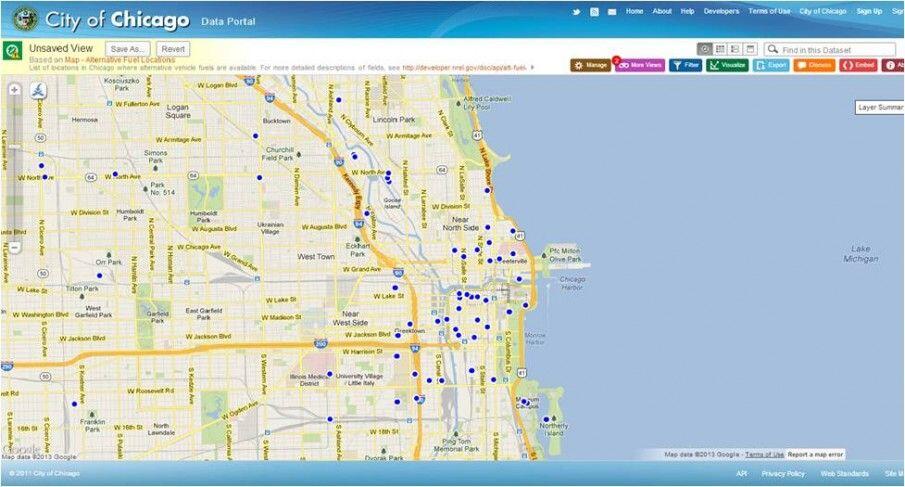- May 29, 2013
- Civic Data
No matter how long the winter, spring is sure to follow—and this year in Chicago, spring has arrived with a campaign for sustainability. In April, the City of Chicago hosted “Earth Data: A Sustainable Chicago 2015 Celebration.” The event highlighted progress on the City’s Sustainable Chicago 2015 initiative, as well as plans for using data to make Chicago a greener, more sustainable city. One of its key announcements: the rollout of two municipal energy-related data sets on the Chicago data portal.
Specifically, these sets let users see energy use throughout the city and locations for alternative fuel for vehicles, making Chicago the first city in the United States to release this type of data. The first aggregates data from local utility companies, Commonwealth Edison and Peoples Gas, to provide an API that details Chicago’s energy and gas usage by census block. The City used census blocks as a geographical measurement in order to maximize data granularity without impeding on the privacy of individual building owners. With 66,974 of these blocks, the result is quite precise. The second data set, meanwhile, is a boon for those who own more fuel-efficient cars.

Both datasets further Chicago’s mission of more open government, and provide a new space for sustainability-related innovations. They have implications for environmental companies and startups, programmers, and citizens who wish to be more environmentally sustainable. But Chicago’s rollout is only step one: for results to occur, the public needs to be aware of the data and ready to put it to use.
To jumpstart the process, Chicago coupled its Earth Data Celebration with the Earth Data Hackathon, a sustainability-themed programming competition encouraging civic hackers to immerse themselves in Chicago’s wealth of sustainability data. Sponsored by the World Wildlife Foundation, the hackathon awarded top projects developed during the weekend event, and will also announce a second round of winners in June. The products that emerged offer what could be the start of a robust line of sustainability-related innovations.
For example, Bike Rack Finder, taking first place at the event, is exactly as it sounds – a mobile website that uses its users’ current location to display nearby bike racks. Taking second, Urbs in Horto was designed to help users identify vacant lots that can be used for urban gardens, and to further help users navigate through the bureaucratic process of establishing one. Other projects in development included productivity apps that that motivate users to engage in energy-saving behavior, and visualizations for understanding Chicago’s overall energy use.
What’s notable about many of these early projects is their potential to cross over into other policy areas. For instance, Bike Rack Finder’s mapping function could be paired with geospatially-enabled crime statistics to help lower incidences of bike theft. Urbs in Horto could not only provide green space to vacant lots, but potentially support local economic development by increasing local food production and helping create new communal spaces for neighborhoods.
Earth Data’s initial apps also strike at the heart of what it means to develop a sustainable city. Pursuing sustainability goes beyond environmentally-friendly development—it’s about perpetually providing for the well-being of a city and its people. It’s this concept of sustainability that’s been embraced by the Sustainable Chicago 2015 initiative as well.
Thus, like Chicago in the spring, the City’s push for sustainability in the digital age has entered a new season.


 Sean Thornton is a Program Advisor for the Ash Center's Civic Analytics Network and writer for Data-Smart City Solutions. Based in Chicago and working in partnership with the city's Department of Innovation and Technology, Sean holds joint Masters’ degrees from the University of Chicago, in Public Policy and Social Service Administration. His work has spanned the city's public, philanthropic, and nonprofit sectors.
Sean Thornton is a Program Advisor for the Ash Center's Civic Analytics Network and writer for Data-Smart City Solutions. Based in Chicago and working in partnership with the city's Department of Innovation and Technology, Sean holds joint Masters’ degrees from the University of Chicago, in Public Policy and Social Service Administration. His work has spanned the city's public, philanthropic, and nonprofit sectors.

